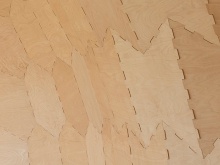Performative Morphology
ICD/ITKE Research Pavilion 2015
Natural structures exhibit differentiation and local adaptation of their geometric, physical and chemical properties and, thus, employ principles of morphology that to this day are mostly unknown to architecture. In recent years architecture has experienced an unprecedented increase of technological possibilities for advancing architectural design. With the advent of computational design techniques, digital simulation and fabrication processes as well as current developments in material science, the preconditions for a meaningful translation of relationships between form and function in natural systems into architecture are better today than ever before. The studio will focus on segmented shells in nature, their constructional morphology, ontogenesis, and their transfer into architectural applications.
The study of the biological role models/concept generators will be performed in collaboration with biology students of University of Tübingen. The goal is to understand basic principles of structural morphology in natural role models and to translate these into novel constructional and spatial structures for architecture. Emphasis will be placed on the development of integrative computational processes of form generation that are informed by parameters of biological morphology, material, structure, as well as robotic fabrication.
The studio will start off with biological research focusing on the identification of biomimetic principles with constructive and architectural potential, which will be researched in close collaboration with the biology students of University of Tübingen. Students taking the studio will be required to take the ‘Architectural Biomimetics’ seminar that will be taught concurrently. The biological research phase will be complemented by a system development phase whose purpose will be the abstraction of the identified principles from their biological context with respect to materiality and possible means of fabrication that may allow a transfer into a material system. In the final phase, a design proposal for a research pavilion will be developed aiming at a synthesis of biomimetic, structural, material, and fabricational principles.
The core of the studio will deal with the translation of the identified principles into the digital domain along with their structural and architectural implementation in the physical domain. A strong focus will be set on the algorithmic and numerical modeling of properties and behaviors, for which we strongly advise the students to take part in the ‘Computational Design’ seminar, which will also be taught during the first semester. These computational processes and construction systems will be developed, experimented with and put to the test during the course of a design project for a new research pavilion.
Similarly to previous years, we are aiming at combining the most promising principles and material systems for the realization of a new ICD/ITKE Research Pavilion on the university campus in the following spring and summer term.


